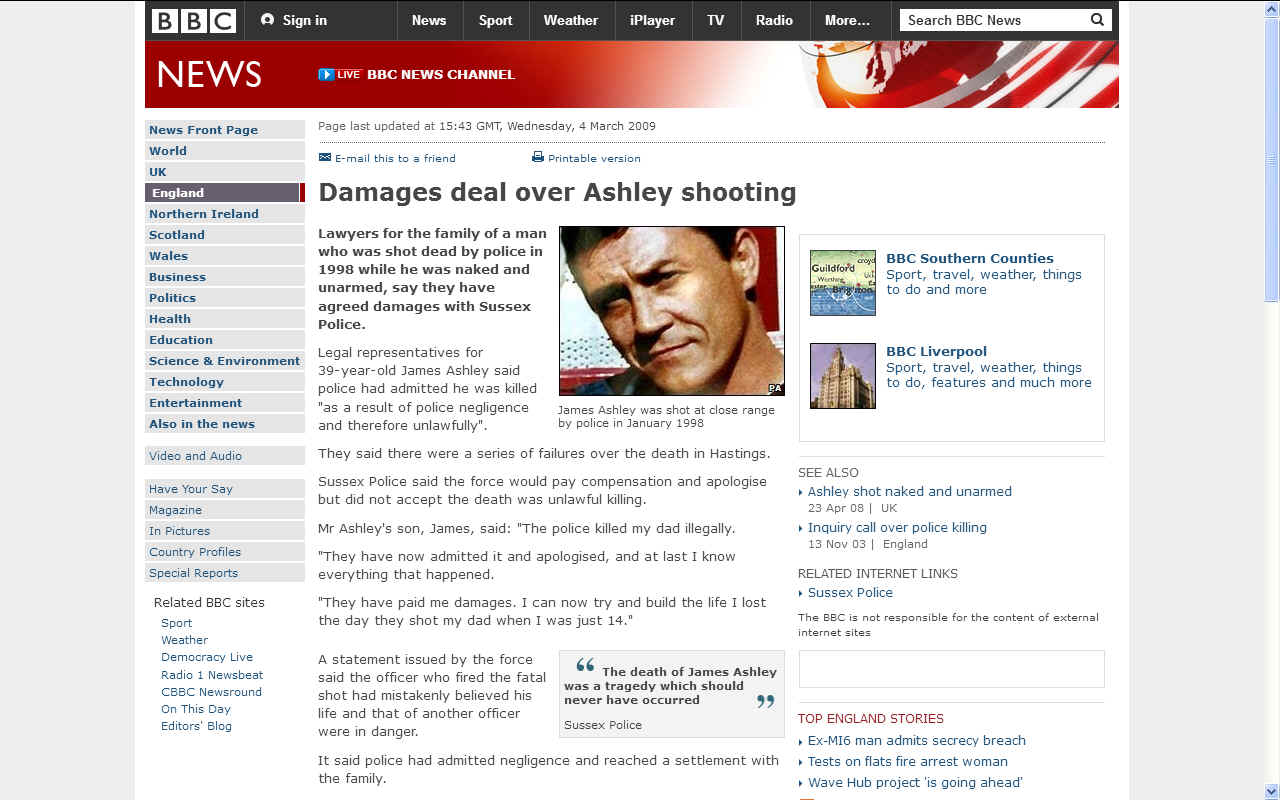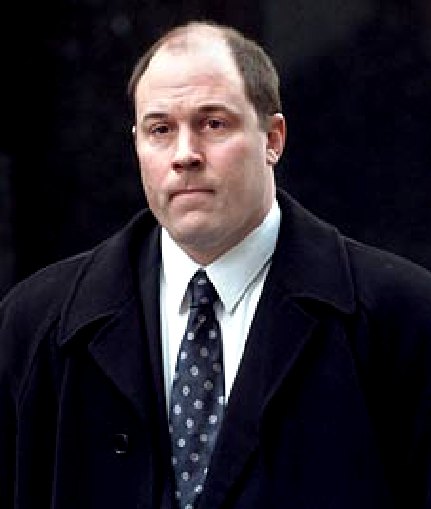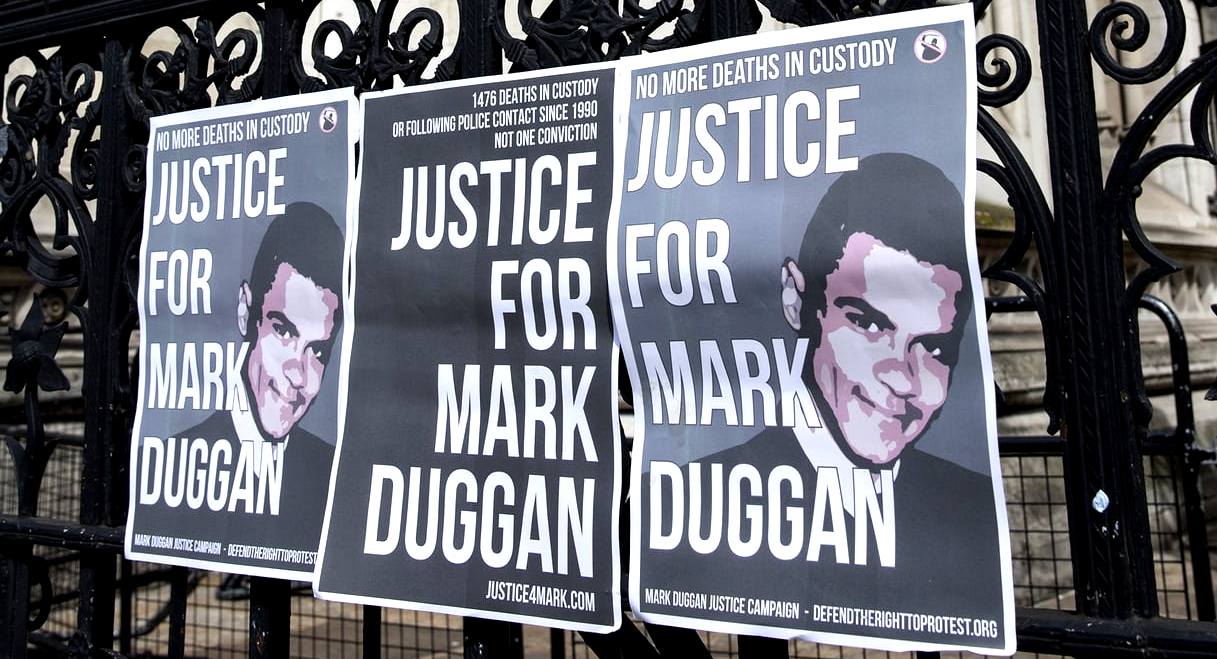|

James Ashley was a 39-year-old British man shot dead by armed police while unarmed and naked, during a raid on his Sussex flat in St
Leonard's on the 15th of January 1998.
After Police Constable Chris Sherwood and four other officers were all charged with murder and manslaughter and found not guilty in Ashley's death, they continued to serve as policemen. Five other police officers who were suspended following the shooting unsuccessfully attempted to sue the
Sussex police for the "psychiatric injury" they suffered due to alleged improper training they received.
In March 2009 Sussex Police agreed to compensate and apologise to Ashley's family. The police admitted negligence – that there had been a series of police failures - but not unlawful killing. Ashley's son however maintained the killing was illegal, and along with the rest of the family, continue to pursue the matter.

HANSARD
HOUSE OF COMMONS, MONDAY 11th FEBRUARY 2002
Louise Ellman MP (Liverpool, Riverside): The fatal shooting of the sleeping
unarmed James Ashley at around 4:20 am on 15 January 1998, when five of a group of 25
heavily armed police burst into his Hastings flat, demonstrates the failings of Sussex police, the inadequacy of police accountability and a lack of concern for the bereaved.
A single bullet fired at point blank range by Police Constable Chris Sherwood killed James Ashley, aged 39, as he stumbled out of bed dazed by the light of the torch shone by the raiding police. No arms or drugs were found on the premises, contrary to the information on which authorisation for the raid rested.
Jimmy Ashley's family are my constituents. I have witnessed their deep grief at their loss but that grief has been followed by anger and incredulity that no one has been brought to account for the needless death. Indeed, in the four years since, little has been revealed in the
public sphere, little action has been taken, no one has been brought to account for what happened and it looks as if few lessons have been learned.
The Ashleys first heard of Jimmy's killing through a chance television and teletext viewing. Indeed, at one stage a neighbour who had been
listening to the radio approached them. They heard that someone who answered the description of their son had been shot dead by police in an area of Hastings where they knew their son lived. No name was given at that stage but they suspected that something was wrong.
The family made a series of telephone calls to Sussex police, to coroners and to a range of other individuals and organisations. They were given little information and even less help. They were never officially informed that James Ashley had died and they have never been officially told what happened. It was only after their numerous telephone calls, each striving to access the information that they needed, that they finally established that the dead man was their son and brother.
To make a tragic situation even worse, a few hours after stumbling on the news of Jimmy's death, the family were to hear on television
Chief Constable Paul Whitehouse publicly casting false aspersions on Jimmy's character and insisting that his officers had acted properly.
The family made a referral to the Police Complaints Authority. It was after that complaint was made that the PCA commissioned reports into what had happened. Barbara Wilding, then assistant chief constable of Hampshire police, was asked to produce a report into the chief constable's involvement in what happened. Those reports were produced and delivered to the PCA, which, following its normal procedures, issued letters accepting the adequacy of the reports. Yet neither report has ever been published and neither report has been exposed to public scrutiny.
The information in the reports has become known only because there were leaks to the press, specifically to
The
Guardian, which published a detailed article in 2001. I draw on much of the information in the leaked articles for my comments.
It is a matter of importance, for the record, that, to the best of my knowledge, nothing in the reports has been denied. The Wilding report found a complete failure of corporate duty by Sussex police. The Hampshire inquiry concluded that three police officers lied about intelligence in order to persuade Deputy Chief Constable Mark Jordan to authorise the raid. The report found that the raid was
"authorised on intelligence that was not merely exaggerated, it was determinably false ... there was a plan to deceive and the evidence concocted."
That is absolutely damning.
The report also showed that the guidelines on firearms put together by the Association of Chief Police Officers was breached. Experts on firearms and the law told Kent police that even if the intelligence had been correct, the firearms should not have been authorised.
The chief constable was castigated. Sir John Hoddinott concluded that Paul Whitehouse, the then chief constable,
"wilfully failed to tell the truth as he knew it, he did so without reasonable excuse or justification and what he published and said was misleading."
Sir John found evidence against Deputy Chief Constable Mark Jordan. That included criminal misfeasance and neglect of duty, discreditable conduct and aiding and abetting the chief constable's false statements. There was suggested evidence of collusion between some or all of the chief officers and an arguable case of attempting to pervert the course of justice.
These statements were contained in those investigation reports. The reports have been kept secret - apart from the leaks made to the press - and have never been available for public scrutiny. After four years, it is reasonable to ask what action has been taken in the face of such gross abuses.
I note that there are a number of players un the complaints system for the police, which has relevance when we consider that four years have passed. Thos players are the Police Complaints
Authority, the Crown Prosecution
Service, the Sussex police authority and others. In considering the comments that I am make, I ask my right honourable friend the Minister to consider what the role of those key players should have been and where the dereliction of duty lay.
The CPS refused to prosecute senior officers. In May 2001, the presiding judge halted the Old Bailey trial of the police officer who shot
James Ashley dead. At a separate trial in Wolverhampton the same month, the officers who planned the raid were acquitted when the CPS offered no evidence, alleging that the depth of corporate failure was too great to make any individual responsible. Tow of the officers involved were promoted with backdated pay increases - an insult to the memory of James Ashley and an absolute affront to his bereaved family.
Deputy Chief Constable Mark Jordan was suspended on full pay for nearly three years before being retired permanently on ill-health grounds with a full retirement pension at the age of 43. That enabled him to escape disciplinary procedures, yet on 21 March 1998, during the debate on the Home Affairs Committee inquiry into police complaints in the aftermath of anger about the consequences of the Hillsborough tragedy, the House was promised that the police would no longer be able to evade disciplinary action in that way. That promise was given to the House in March 1998, yet four years afterwards apparently nothing has happened.
Indeed, the definitive action has been the resignation of Chief Constable Paul Whitehouse in June 2001. That followed an intervention by my right honourable Friend the Home Secretary. I praise the Home Secretary for his resolute action. His was the first clear action from the Home Office that led the police having to face up to the consequences if what they had done. In the days that followed the Home Secretary's statement, Paul Whitehouse started to criticise the Home Secretary and queried the legitimacy of his statement, but the result was obtained, and
Paul Whitehouse, the chief constable at the time of the shooting, resigned.
During the past two months disciplinary charges have been filed against three police officers. I presume that the hearings that relate to the disciplinary charges will be internal, not a matter for public scrutiny.
What should happen now? In is self evident that the criminal justice system has failed the Ashleys. I call for the immediate publication of the Hoddinott and Wilding reports and for a full pulic inquiry into the events that led up to the shooting of James Ashley and in its aftermath, including the handling of the complaints.
Today, by a great coincidence, I have seen a report submitted by Sussex police authority that says that the police inspectorate has carried out an investigation, that 26 recommendations about changes in the way that Sussex police operate have been made and that many of them have been implemented. However, having read that report, I stil find it impossible to ascertain whether all those recommendations have been implemented. Indeed, none of them refer to the need for public scrutiny of what happened on the early morning when James Ashley was shot dead. Nothing in the report tells us how we should overhaul the police complaints system.
In a letter to me dated 27 June 2001, Sir Alistair Graham, the chairman of the Complaints Authority, stated:
"it is not possible to let you have a copy of Barbara Wilding's and John Hoddinott's reports as section 80 of the Police Act 1996 specifically debars us from doing this except in special circumstances."
After four years of non-action, I plead those special circumstances. I specifically reject the explanation passed to be my right
honourable Friend the Minister of 8 January 2002 when I was informed that the reports could not be made public because the Sussex police authority would not agree to it. It cannot be acceptable for a police authority that is in the dock itself to veto action of such great public importance. I do not intend to shoot the messenger, but I castigate the ruling of the police authority.

BBC NEWS 4 MARCH 2009
Lawyers for the family of a man who was shot dead by police in 1998 while he was naked and unarmed, say they have agreed damages with Sussex Police.
Legal representatives for 39-year-old James Ashley said police had admitted he was
killed "as a result of police negligence and therefore unlawfully".
They said there were a series of failures over the death in Hastings.
Sussex Police said the force would pay compensation and apologise but did not accept the
death was unlawful killing.
Mr Ashley's son, James, said: "The police killed my dad illegally.
"They have now admitted it and apologised, and at last I know everything that happened.
"They have paid me damages. I can now try and build the life I lost the day they shot my dad when I was just 14."
The death of James Ashley was a tragedy which should never have occurred
Sussex Police
A statement issued by the force said the officer who fired the fatal shot had mistakenly believed his life and that of another officer were in danger.
It said police had admitted negligence and reached a settlement with the family.
"Sussex Police wishes to reiterate that the death of James Ashley was a tragedy which should never have occurred and it was caused by a series of failures at levels of Sussex Police in relation to events prior to the raid and its planning and execution," it added.
"Sussex Police also acknowledges that there were serious shortcomings in the way in which the aftermath of Mr Ashley's death was handled."
The statement said the force had not made any admissions that Mr Ashley was unlawfully killed when he was shot on 15 January, 1998.
Officer acquitted
It said Pc Sherwood, an officer from the Sussex Police Special Operations Unit, had always maintained he acted in self defence and was acquitted of murder and manslaughter in the crown court.
Family solicitor Jane Deighton said: "Jimmy's family sought the truth. They made a formal complaint, issued legal proceedings and started the Justice for Jimmy campaign.
"Not for one day did they let the pressure off.
"Their achievements are a remarkable memorial to Jimmy, and contribution towards holding the police accountable."
And Liverpool Riverside MP Louise Ellman said the strength of the family, in what was a tragic case, ensured Mr Ashley's reputation had been cleared and was a great tribute to them.
Mr Ashley was in bed when officers burst into his home at 0400 GMT.
He was shot in front of his girlfriend after incorrect intelligence suggested he might be armed.
MORE
SUSSEX POLICE NEGLIGENCE
Sussex
Police ignored the complaints of Shana
Grice and a series of serious frauds, in the manipulation of
property values by Wealden District Council officers in positions of
trust. A Petition by 12 independent
members of the public in 1997 whose allegations of criminal acts were
referred to Sussex Police have still not been investigated.
It
is worse than that, the failure of Sussex Police to investigate serious
crime on their patch is more a conspiracy to pervert the course of
justice - or even worse - serious organised planning crime that ought
properly to be investigated at a higher level. What is insane is that
the present Chief Constable, Giles York was awarded the Queens
Police Medal, we can only presume for being willing to take over a force
that is alleged to be in cahoots with corruption by another local
authority.
Turning
a blind eye to corruption is not negligence, it is criminal
acquiescence, making Sussex Police party to the offences and guilty of
failing to investigate a crime.
Some
of these matters have been brought to the attention of Katy
Bourne, the current Crime Commissioner for Sussex.
LINKS
& REFERENCE
http://news.bbc.co.uk/1/hi/england/7923803.stm


|




